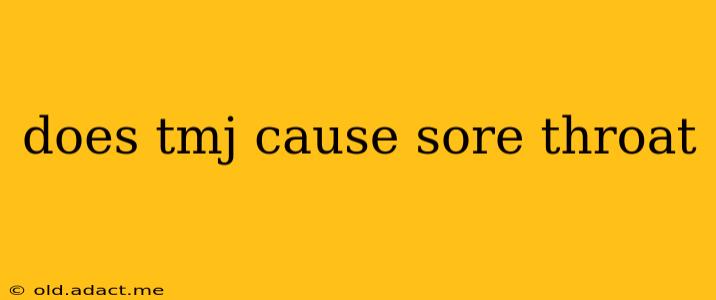Temporomandibular joint (TMJ) disorders can be incredibly frustrating, impacting not just your jaw but potentially other areas of your body. One frequently asked question is whether TMJ can cause a sore throat. While not a direct cause-and-effect relationship in the way a cold might, there's a significant correlation and several reasons why TMJ issues can lead to throat discomfort. Let's explore this connection in detail.
Can TMJ Problems Lead to Sore Throat Pain?
Yes, TMJ problems can contribute to sore throat symptoms. However, it's crucial to understand that TMJ itself doesn't directly cause a sore throat in the way a bacterial or viral infection does. Instead, the pain and discomfort associated with TMJ can manifest in ways that mimic or exacerbate a sore throat.
How TMJ Might Cause Sore Throat Feelings:
-
Muscle Tension and Referrals: The muscles surrounding the jaw are interconnected with the muscles of the neck and throat. When TMJ dysfunction leads to muscle tension and spasms in the jaw, this tension can radiate to the throat, causing pain and stiffness. This is known as referred pain. The pain isn't originating in the throat itself, but it's felt there due to nerve pathways.
-
Postural Changes: Chronic TMJ issues often lead to postural changes, including forward head posture. This can strain the muscles in the neck and upper back, potentially impacting the throat muscles and contributing to discomfort. Poor posture can also restrict airflow and lead to dryness, which can feel like a sore throat.
-
Mouth Breathing: Individuals with TMJ pain sometimes resort to mouth breathing, especially during sleep, due to jaw discomfort or nasal congestion. This can dry out the throat, leading to irritation and a scratchy feeling.
-
Stress and Tension: TMJ disorders are often linked to stress and anxiety. This heightened stress level can manifest as muscle tension throughout the body, including in the throat muscles, causing soreness.
-
Misaligned Bite: A misaligned bite (malocclusion) can strain the jaw muscles and cause pain that can spread to surrounding areas, including the throat.
What are the Symptoms of TMJ?
Understanding the typical symptoms of TMJ is crucial for proper diagnosis. These can vary from person to person but often include:
- Jaw Pain: Pain in the jaw joint itself, often described as aching, throbbing, or sharp.
- Headaches: Frequent headaches, particularly tension headaches.
- Earaches: Pain in one or both ears.
- Neck Pain: Stiffness or pain in the neck and shoulders.
- Clicking or Popping in the Jaw: A noticeable clicking or popping sound when opening or closing the mouth.
- Limited Jaw Movement: Difficulty opening or closing the mouth fully.
- Facial Pain: Pain in the face, particularly around the cheeks or temples.
When to See a Doctor?
If you're experiencing a persistent sore throat alongside jaw pain, clicking, or limited jaw movement, it's essential to consult a healthcare professional. They can diagnose the underlying cause of your symptoms and recommend appropriate treatment. Self-treating can be detrimental, so professional guidance is vital.
How is TMJ Diagnosed?
Diagnosing TMJ involves a thorough examination by a dentist or doctor specializing in TMJ disorders. This may include a physical examination of the jaw, palpation of the jaw muscles, and a review of your medical history. Imaging techniques like X-rays or MRIs might be used in some cases to rule out other conditions.
What Treatments are Available for TMJ?
Treatment options for TMJ vary greatly depending on the severity of the condition and its underlying causes. Options can include:
- Medications: Pain relievers, muscle relaxants, or anti-inflammatory drugs may be prescribed to manage pain and inflammation.
- Physical Therapy: Exercises and therapies to improve jaw mobility and strengthen the surrounding muscles.
- Splints or Mouthguards: These appliances help to reposition the jaw and reduce strain on the joint.
- Lifestyle Changes: Stress management techniques, improving posture, and dietary adjustments.
- Surgery: In severe cases, surgery might be considered, although it's generally a last resort.
In conclusion, while TMJ doesn't directly cause a sore throat in the traditional sense, the related muscle tension, postural changes, and overall discomfort it creates can easily mimic or worsen throat pain. If you're experiencing both, seeking professional medical attention is crucial for proper diagnosis and effective treatment.
